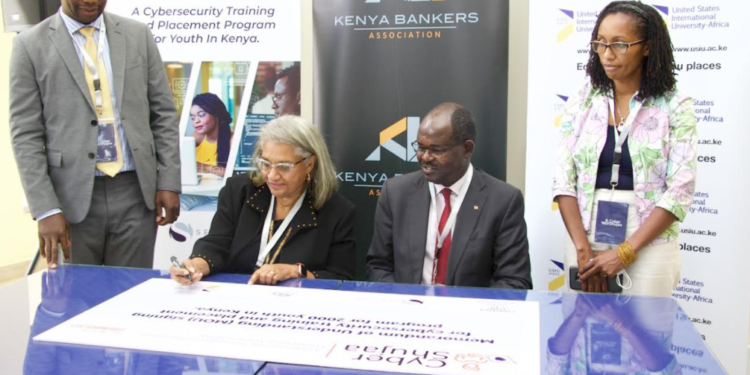The drive to grow the base of Kenya’s cyber security expertise received a major boost today when, for the first time, an industry-led training program to add 2,000 professionals was unveiled by USIU-Africa, Kenya Bankers Association and Serianu.
Known as Cyber Shujaa, the training program’s novelty is illustrated in the development and implementation of a harmonized cybersecurity employment framework linking the industry and the training institutions. It targets to bring 1,000 women on board as cybersecurity professionals and to support at least 30 young people as cybersecurity entrepreneurs.
Speaking during the signing of the Memorandum of Understanding between the consortium members, the Vice Chancellor, USIU-Africa, Professor Freida Brown reiterated the University’s commitment to action research which calls for interventions and co-creation of knowledge with stakeholders.
Read: Equity Group Shareholders To Harvest Ksh11 Bn As Lender Mints Ksh40 Bn In Profits
“This project enhances our university-industry-government-civil society linkages to promote similar future partnerships. This project will brand itself to become a cybersecurity institute to offer a nationally recognized certification in the area of cybersecurity. Our Center Informatics Research and Innovation (CIRI) is striving to be a regional leader and a major player in cybersecurity issues on the continent in the next five years,” said Prof. Freida Brown.
While the dearth of skilled cyber security experts is a global challenge that experts say requires 2 million new practitioners, at the local level it is equally severe, with Serianu research showing that Kenya needs to hire at least 1,000 new experts annually.
“The shortage of skilled cybersecurity professionals has become alarming. We recognized that a multi-agency approach to creating a pathway for learners to transition into the industry as practicing cybersecurity executives is key to bridging the local skills gap,” said William Makatiani, the Chief Executive Officer of Serianu.
Read: Kenya To Host Region’s First Trade Facilitation Summit
Makatiani pointed out that the firm’s research had established that Kenya’s burden of burgeoning cybercrime, estimated at Kshs 10 billion in annual losses, was exacerbated by a severe lack of sufficient well-trained cybersecurity executives.
“With more women taking up ICT courses at the tertiary learning institutions, we are convinced that the partnership we have founded with USIU-Africa and Kenya Bankers Association will accelerate the growth of our national cyber professional expert base,” added Makatiani. The firm found in its 2019 cybersecurity survey that only 10 per cent of practicing cyber security professionals are women, yet they are immensely interest in pursuing the career.
Through the consortium, Kenya Bankers Association will provide the market intelligence that informs the curriculum development, USIU-Africa will design the curriculum and ensure the youth are at the heart of the program while Serianu will provide the technical training and practical immersion.
Read: Toyota Kenya Rebrands to CFAO Motors Kenya
Outlining the industry practical fit for the program, Kenya Bankers Chief Executive Officer Dr. Habil Olaka said that the financial services sector was a key interested party in its success owing to the nature of their business and the fact that it touches every sphere of the economy.
“While the uptake of these platforms continues to support financial inclusion across demographics, cases of digital fraud have also increased. Increasingly, fraudsters continue to target vulnerable users through identity theft, social engineering, and phishing emails, among other forms of fraud that exploit low levels of awareness on the part of consumers. The evolving fraud trends threaten gains that have been achieved in the economy over the past decades, making it necessary for stakeholders to work together towards containing it,” said Dr. Olaka.
This partnership provides a unique approach to capacity building and skills development where there is a direct relationship between the content that the students are taught and where the financial sector’s present and future needs lie,” added Dr. Olaka. He noted that as technology evolves rapidly, a tripartite education and training approach for speedy skilling and placement will reduce the economy’s exposure to marauding cybercriminals who are undeterred by geographical boundaries.
“As the umbrella body of commercial banks, the Kenya Bankers Association remains committed to applying innovative solutions to security challenges and will continue to engage on partnerships that seek to deliver value to our stakeholders, the banking public and the economy at large,” added Dr. Olaka.
Read: KCB’s Profit After Tax Hits Ksh34.2B In Full Year 2021
















